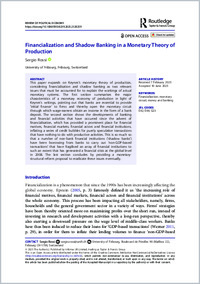Financialization and Shadow Banking in a Monetary Theory of Production
BP2-STS
- Rossi, Sergio ORCID University of Fribourg
- 2025
Published in:
- Review of Political Economy. - Informa UK Limited. - 2025, p. 1-15
English
This paper expands on Keynes’s monetary theory of production considering financialization and shadow banking as two relevant issues that must be accounted for to explain the workings of actual monetary systems. The first section summarizes the major characteristics of a monetary economy of production in light of Keynes’s writings, pointing out that banks are essential in order to provide ‘initial finance’ to firms and thereby open the monetary circuit through which wage-earners obtain an income in the form of a bank deposit. The second section shows the developments of banking and financial activities that have occurred since the advent of financialization, which has provided a prominent place to financial motives, financial markets, financial actors and financial institutions inflating a series of credit bubbles for purely speculative transactions that have nothing to do with productive activities. This is so much so that a number of non-bank financial institutions (‘shadow banks’) have been borrowing from banks to carry out ‘non-GDP-based transactions’ that have fragilized an array of financial institutions to such an extent that has generated a financial crisis at the global level in 2008. The last section concludes providing a monetary–structural reform proposal to eradicate these issues eventually.
- Faculty
- Faculté des sciences économiques et sociales et du management
- Department
- Département d'économie politique
- Language
-
- English
- Classification
- Economics
- License
- Open access status
- green
- Identifiers
-
- DOI 10.1080/09538259.2025.2520259
- ISSN 0953-8259
- Persistent URL
- https://folia.unifr.ch/unifr/documents/332374
Statistics
Document views: 66
File downloads:
- rope2025paperaspublished: 25
